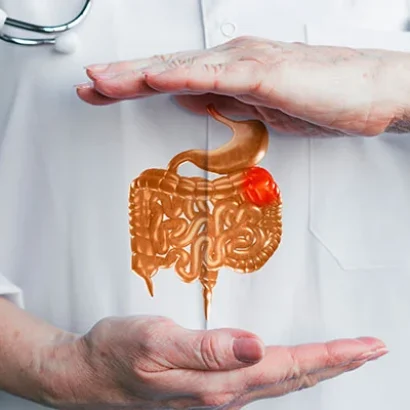
What Is a Gastroenterologist and What Do They Do?
A gastroenterologist is a doctor who specializes in treating diseases and conditions related to the gastrointestinal (GI) tract and digestive system. The GI tract includes the oesophagus, stomach, small intestine, large intestine, rectum, gallbladder, pancreas, and liver.
Gastroenterologists complete advanced training beyond medical school to become experts on the complicated digestive system. They must first complete a three-year internal medicine residency before undergoing two to three additional years of specialized training in gastroenterology. This extensive education allows them to provide more specialized care than primary care doctors for issues affecting the digestive organs.
Table of Contents
ToggleWhat Does a Gastroenterologist Do?
Gastroenterologists are experts in evaluating, diagnosing, and managing a wide range of digestive disorders and conditions including acid reflux, GERD, ulcers, haemorrhoids, and IBS. Some of the main duties of a gastroenterologist include:
- Helping patients manage chronic digestive conditions with regular follow-ups
- Performing endoscopies such as colonoscopies, sigmoidoscopies, and upper endoscopies to screen for diseases and get a visual of the GI tract
- Interpreting test results (blood tests, stool tests, CT scans, MRIs) to diagnose conditions
- Developing treatment plans which may include medications, dietary changes, surgery, or endoscopic procedures
- Referring patients to surgeons and specialists if needed
- Educating patients on prevention methods for GI issues
What Conditions Do Gastroenterologists Treat?
Some of the most common conditions that gastroenterologists diagnose and treat include:
- Acid Reflux and GERD: When stomach acid frequently flows back up into the oesophagus, it causes painful symptoms known as acid reflux or GERD. Gastroenterologists can evaluate the root cause and prescribe medicine, diet changes, or surgically repair hiatal hernias contributing to the condition.
- Irritable Bowel Syndrome: IBS involves chronic abdominal pain with diarrhoea and/or constipation. Gastroenterologists can diagnose IBS through tests to rule out other diseases before recommending antispasmodics, fibre supplements, probiotics, stress reduction techniques, or changes in diet.
- Inflammatory Bowel Diseases: IBD includes Crohn’s disease and ulcerative colitis which cause inflammation anywhere along the digestive tract. After confirmation through endoscopies and biopsies, gastroenterologists will typically prescribe anti-inflammatory drugs, immune system suppressors, pain relievers, probiotics, and/or diet changes.
- Ulcers: Painful sores can line the stomach, small intestine, or esophagus. Gastroenterologists determine if H. pylori bacteria or overuse of NSAID pain relievers are causing excess stomach acid leading to ulcers. Treatment usually involves antibiotics, acid reducers, and stopping NSAID use so sores can heal.
- Hepatitis: Liver inflammation from hepatitis viruses or autoimmune disorders needs specialized gastroenterological care. They help manage symptoms and complications through antiviral medications, immunosuppressants, or steroid therapy while monitoring liver function.
- Gallstones: Hard deposits blocking bile ducts or pancreatic juices cause severe abdominal pain requiring emergency gallstone removal. Gastroenterologists can determine if surgical or non-surgical procedures are most appropriate based on the case severity.

When Should You See a Gastroenterologist?
You should make an appointment with a gastroenterologist if you experience any of the following:
- Frequent heartburn, regurgitation, or chest pain not resolving with lifestyle changes or over-the-counter medications
- Difficulty swallowing which persists or worsens
- Blood in vomit or stool
- Unresolved nausea, vomiting, or abdominal pain
- Persistent constipation, diarrhoea, or bowel accidents
- Unexplained weight loss or appetite changes
- Family history of gastrointestinal cancers or IBD
- Jaundice (yellowing skin or eyes)
If you are experiencing any of these symptoms, consider visiting Hale Clinics, which has the Best Gastroenterologist in Mohali. Seeing a gastroenterologist for proper diagnosis and treatment can help alleviate uncomfortable digestive problems and prevent serious complications. They have the expertise and tools needed to thoroughly assess GI issues.
Conclusion
Calling on gastroenterology expertise can help tackle digestive difficulties before they escalate into emergencies. With advanced training focused specifically on the intricate gastrointestinal system, gastroenterologists play a vital role in keeping digestion running smoothly!
If you’re experiencing any health-related issues, consider scheduling an appointment at Hale Clinics, known as one of the Best Multi Specialty Clinics in Mohali, where you’ll receive top-notch care and hospitality from experts.
FAQs
Q1. What is a gastroenterologist?
Ans. A gastroenterologist is a doctor who specializes in treating diseases and conditions related to the gastrointestinal (GI) tract and digestive system.
Q2. What are some common conditions treated by gastroenterologists?
Ans. Gastroenterologists treat a wide range of conditions including acid reflux, irritable bowel syndrome (IBS), inflammatory bowel diseases (IBD) like Crohn’s disease and ulcerative colitis, ulcers, hepatitis, gallstones, and more.
Q3. What are some common symptoms that may require a visit to a gastroenterologist?
Ans. Symptoms like abdominal pain, bloating, diarrhoea, and constipation require a visit to a gastroenterologist.
Q4. What types of procedures do gastroenterologists perform?
Gastroenterologists perform various procedures such as colonoscopies, sigmoidoscopies, upper endoscopies, and other endoscopic procedures to diagnose and treat conditions affecting the gastrointestinal tract.
Q5. Do gastroenterologists only treat adults, or do they also treat children?
Ans. Gastroenterologists can treat patients of all ages, including children. Paediatric gastroenterologists specialize in diagnosing and treating digestive disorders in infants, children, and adolescents.
